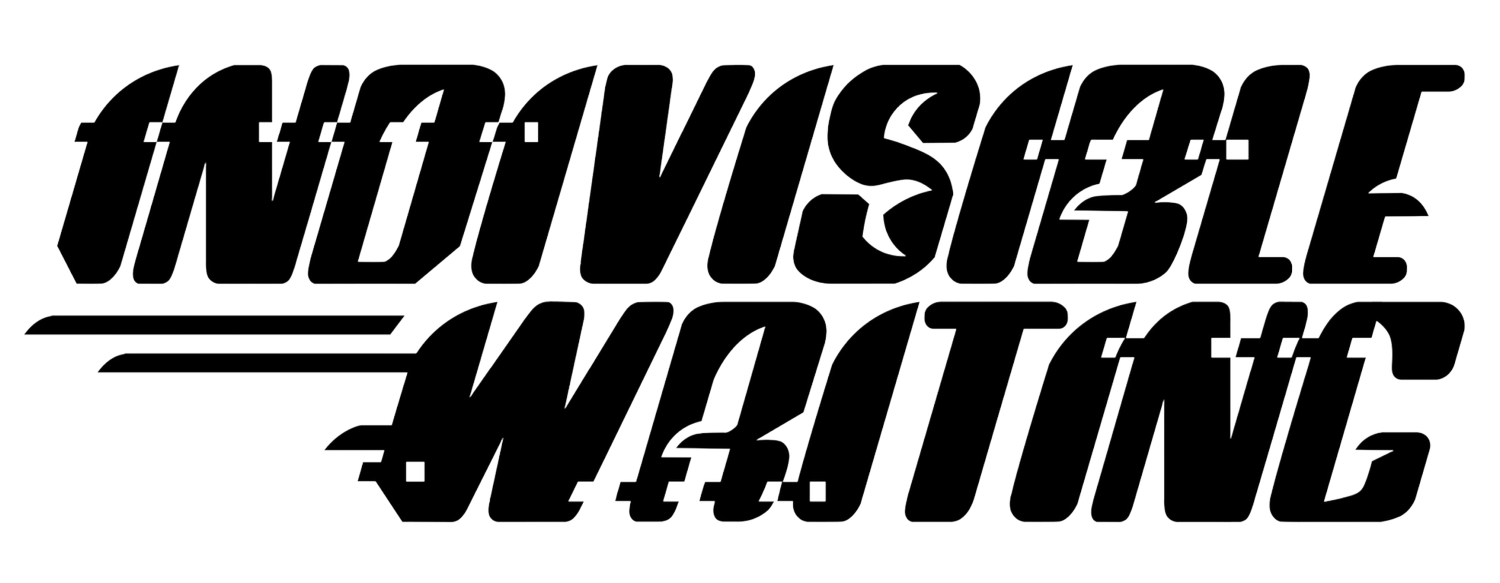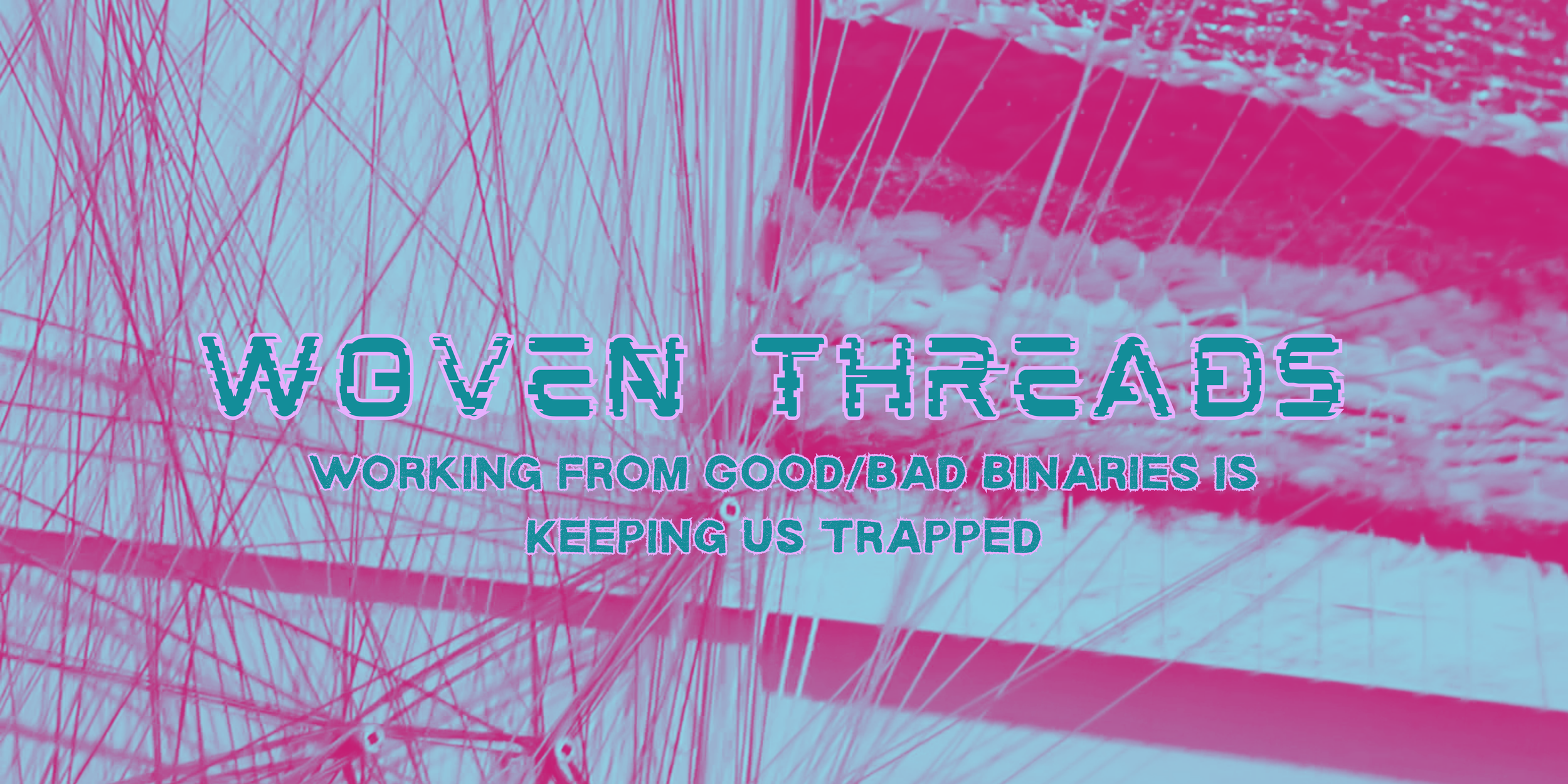Woven Threads: Working From Good/Bad Binaries Is Keeping Us Trapped
Woven Threads is a series of blog posts where I compile and expand on tweets and threads I’ve posted on Twitter. They may cover a number of topics that I often ruminate on.
There’s one thing that I’ve realized in my healing: We have to retire the idea that everyone wants to be good. Truthfully, most people just want to be secure. If you believe that being good—or kind or generous or whatever you define as good—leads to insecurity, you're not going to care about being good. You're going to care about whatever it is that makes you feel secure.
I think a lot of us want to believe that there are universal morals that we should all know innately. But morality is a colonial and religious concept that was imposed on peoples across the globe rooted in the idea that “humanity” was separate and above from the natural world—that the natural world existed to fulfill our needs and our needs only—but only if we followed the immutable laws of a celestial being that had chosen European monarchs to enforce on its behalf.
While Western society has recently embraced a more “secular” ideology as a standard of “civilization”, many of us still adhere to the belief in universal morals. It’s something that helps us feel safe: If everyone is capable of doing hurtful or harmful things by accident then how do we find safety? In the end, a lot of our ideas of what is "good" or "bad" is rooted in the understanding that "bad" is whatever hurts the relationships or structures around us that make us feel secure and being "good" is what makes people like us or want to be around us.
But “good” and “bad” can’t exist in a vacuum. No single action can always be good or always be bad. As we see in the criminal justice system, even our laws are imposed to protect the people who are creating them. Because of how colonialism functions, all of our cultural ideas of “good” and "bad” are centred on upholding capitalism and capitalism wants us to believe that we can only depend on money.
It’s why we idealize celebrities and leaders, refusing to believe that they can be just as villainous or careless or selfish as any other person. We want to believe that harmful people will get what’s coming to them and that heroes will get their rewards in the end. And in a capitalist system, the “rewards” are success and fame and loyalty—which can all be measured by what’s in your bank account and what people are willing to spend to be around you. We end up basing our idea of security (and therefore "good") around “contributing to a productive society.”
On a physiological level, we achieve that feeling of security by being in connection with each other. So our society was designed to monetize and commodify connection to make us reliant on the economy for our sense of connection, making it a lot easier for people to make choices that’d hurt others in the name of the economy. We’ve been taught that “Hurting the economy = hurting everyone”, so hurting the economy to protect “some people” is acting in the Greater Good.
Which is why throughout history people have slowly accepted, and even championed, fascism when it beckons seductively from the shadows it lurks in. We need to understand that fascism uses fear and isolation to function. It weaponizes the wounds capitalism inflicts and deflects the blame onto the easiest targets so the people benefitting from it can continue to benefit from it.
Which also makes me think of Lee Shevek's (@butchanarchy) point about fascism and intimate partner abuse using the same strategies. It’s why patriarchy still harms men through punishment of emotional regulation leading to repression and leveraging each other’s self-worth in competition for resources. But then it also creates narratives that oppression is beneficial for the “growth” of civilization and evidence to the contrary would send us down a slippery slope to Hell.
As Kai Cheng Thom has pointed out, the difference between many abusive behaviours and survival strategies is power. And we have to acknowledge that capitalism and colonialism have all traumatized our oppressors. People with open wounds aren't able to discern threats from support on their own and when wounded people are afraid, they'll lash out at both.
This is why sex and consumerism feel like solutions. They help numb the pain with quick temporary fixes. It becomes pretty easy to get people to obey if you’re offering promises of an endless supply of sex and luxury as a reward for their loyalty.
We need to name and be blunt about the harm that results from perpetuating oppressive systems, but when we dehumanize "fascists", we actually play into capitalism’s hand.
To be clear: humanizing them isn’t synonymous with supporting or forgiving them and it doesn’t mean prioritizing the "good" in them. It just means remembering that they're human beings whose humanity is being used to control them. Once again, humans aren’t any single thing. We’re all capable of both incredible acts of cruelty and kindness.
And this is something that trauma survivors do know intimately. If you fear enough for your safety, you can be willing to do some terrible things. But something else we know is that fear doesn’t just leave you when you do find safety. If it happens over an extended period, our bodies begin to interpret neutral things as threats, just because they’re associated with the trauma.
For victims of violence, it can be hard to reconcile that for the people who harmed them, growing up in a culture where you don’t just witness, but often are forced to participate in, violence perpetuated onto others is also traumatizing! Which is why it’s important to acknowledge and heal that trauma when you get access to any kind of power—whether it’s the agency you gain as an adult that you were denied as a child or a position of leadership—so you’re able to discern between real and perceived threats before you use the power at your disposal.
We're not responsible for nor can we control other people's healing and we don't have to put ourselves in danger to prioritize it. If you have the power to walk away from someone who’s doing something that hurts you or other people and they don’t want to stop, you should. But anyone who stays in a relationship (of any kind) with that person has to both believe in and be invested in their healing if they expect them to change.
Relationships are a choice. Who we give access to our support and care is something we can have power over. If you knowingly make the choice to be or stay in a relationship with somebody who’s deflecting and projecting their trauma onto people who are already experiencing harm, you’ve already decided that is behaviour you are comfortable with being around.
A lack of action may prevent you from being a perpetrator, but if you're not using the power you do have to change the situation, you're still an enabler. It may come from your own fears of abandonment or isolation or some other trauma wound, but if others can find ways to justify the ways they cause immense harm from their unhealed wounds, that means that we all are capable of it if we’re handed the power to do so.
Honestly, I think most people really want to distance the people who’ve abused them from any kind of trauma they may have experienced because they themselves need to believe in their own innate “goodness”. It really is a lot easier to reduce people down to “good” or “bad” and then define ourselves by who chooses around us.
But when we view people who cause harm as only “bad”, then we’re not going to want to admit that the people we thought proved that we were “good” could also be bad. Which is why we'll never address the root of abuse and violence if we pretend that it's inherent to anyone's being or view them as disposable themselves.
This is why I don’t subscribe to any politics that rely on labelling abusers as narcissists or calling for their systematic eradication.
We don’t have to love the people who harm us, but that doesn’t mean that they are somehow exempt from also being human beings. And understanding how human beings learn to accept violence as inevitable is the only way that we’ll ever convince them that it isn’t.
The goal isn't to flip the script on our oppressors. The goal is to write new scripts where oppression isn't seen as natural and imbued into every facet of our lives. Otherwise we'll continue this cycle, endlessly creating identities for the sole purpose of oppressing them in the name of The Greater Good.

